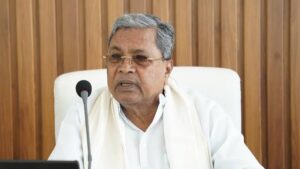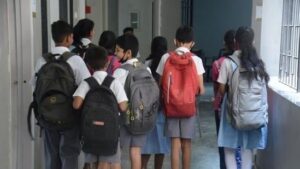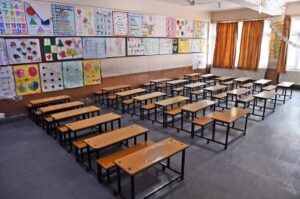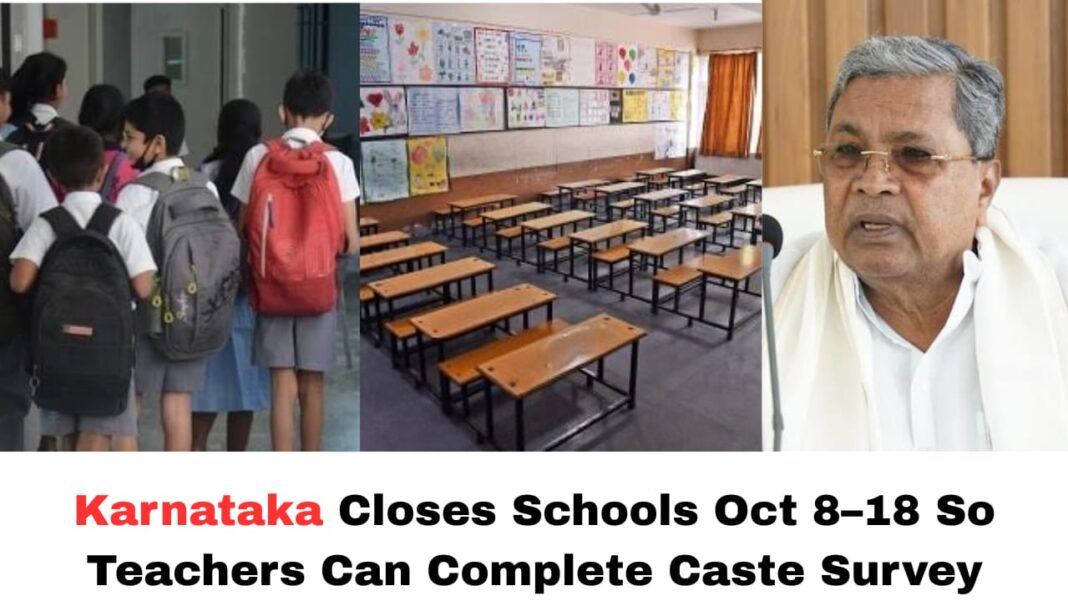Digital News Guru Karnataka Desk:
Karnataka Closes Schools Oct 8–18 as Teachers Focus on Caste Survey
In a notable move blending administrative urgency with political strategy, Karnataka Chief Minister Siddaramaiah has ordered all government and government-aided schools in the state to remain closed from October 8 to October 18, 2025. The official reason: to allow teachers and staff to devote full attention to the ongoing Social and Educational Survey (popularly called the “caste survey”) without the distraction of regular school duties.

Survey Behind the Shutdown
The survey was originally slated to run from September 22 to October 7, but progress across districts has been uneven, forcing the government to extend timelines. Siddaramaiah remarked that while some districts had completed nearly all of their enumeration, others lagged significantly. For example, Koppal had completed about 97 % of its work, whereas Dakshina Kannada and Udupi were reported at only 60-63 %.
In response to pleas from the Teachers’ Association, the government granted the extended break, but did not include teachers who have II PUC (Second Year Pre-University) exam obligations. These educators are exempted from survey duties so that examination demands are not disrupted.
The survey aims to cover about 7 crore people across 2 crore households in Karnataka, gathering social, economic, and educational data to guide future welfare and resource decisions.
Reactions, Impacts, and Concerns
The announcement has drawn mixed reactions from educators, policymakers, and civil society.
Educational Disruption. Many worry that the extended midterm break will exacerbate learning loss. Karnataka students already face pressure to keep pace with curriculum schedules, and ten extra days off can squeeze already tight lesson plans. Some suggest compensatory measures like extra hours or special classes after the break.

Uneven district progress. The district-level survey completion figures underscore the logistical and operational challenges. While some districts like Koppal and Chamarajanagar (98.1 % coverage recently) have done well, urban districts are reportedly lagging. In Bengaluru, for instance, enumeration began late, and progress has been sluggish.
Teacher and staff burden. Teachers working long hours on data collection, often beyond their usual workload, have voiced concerns about fatigue and stress. In Dakshina Kannada, some enumerators had considered boycotting due to exhaustion, but resumed work after appeals by officials.
Political dimension. The survey carries significant political stakes. Some opposition voices question the methodology and intent, alleging the process might be manipulated. Meanwhile, government ministers defend it as an essential step toward more equitable social policy and better targeting of welfare schemes.
Safety & accountability. The survey has faced human cost: at least three teachers died while performing enumeration tasks. The state has promised Rs 20 lakh compensation to each bereaved family.
Managing the Aftermath
To mitigate the academic impact, the government has floated ideas like special post-holiday classes, adding extra hours, and district-level catch-up strategies. The Deputy Chief Minister has said that districts will decide whether to extend school hours or add class sessions to make up for lost days
Another challenge: integrating the survey’s momentum once schools reopen. Ensuring that data collection is fully wrapped up by October 18 will be critical — any slippage could stretch the burden further.

Why It Matters
This episode is more than just administrative rearrangement. It underscores how deeply intertwined education systems are with governance and social policy. The launch conditions of the survey — using teachers as enumerators, halting classes — reflect the state’s approach to large-scale data collection in a context where infrastructure, participation, and logistical reach are uneven.
The quality, accuracy, and acceptability of this survey could influence how Karnataka designs its social welfare and development programs for years to come. Conversely, any perception of bias or poor execution could undermine trust and fuel political backlash.
As October 18 approaches, all eyes will be on whether the survey completes successfully, how the government handles academic recovery, and whether this model becomes a precedent for other states.
You May Also Read: India Launches Biometric Authentication for UPI Payments: Facial & Fingerprint Verification Begins October 8








